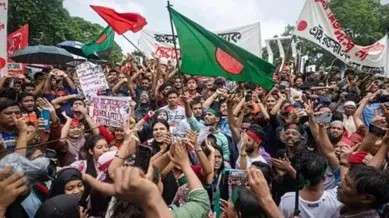Bangladesh’s political landscape has entered a volatile phase as the Awami League (AL) intensifies its nationwide protests against the Muhammad Yunus-led interim government, deepening an already-fraught standoff. The AL’s latest call for shutdowns and mass demonstrations reflects a strategic escalation aimed at challenging what it describes as an “undemocratic and politically motivated regime”. The immediate flashpoint is the ongoing trial of former Prime Minister Sheikh Hasina, the banning of AL’s political activities, and the government’s sweeping restrictions on opposition mobilisation.
Research agencies tracking South Asia’s political transitions note that this confrontation is not merely episodic but structural. Following the 2024 uprising that brought Yunus to power, the interim government has struggled to establish legitimacy while simultaneously enforcing stringent measures to prevent political mobilisation. Analysts argue that the ban on one of the country’s largest parties creates a democratic deficit that complicates the planned 2026 elections and undermines public confidence in transitional governance.
The government’s counter-narrative accusing the AL of using misinformation and AI-generated videos further highlights the emerging role of digital propaganda in Bangladesh’s political contestation. Security crackdowns, tightened checkpoints, and restrictions on public gatherings indicate growing institutional anxiety about unrest spiralling into a nationwide disruption.
The standoff has broader implications for economic stability, foreign investment flows, and regional diplomacy, particularly with India. As both sides harden their positions, the coming weeks will be critical in determining whether Bangladesh moves toward electoral reconciliation or deeper political fragmentation.

